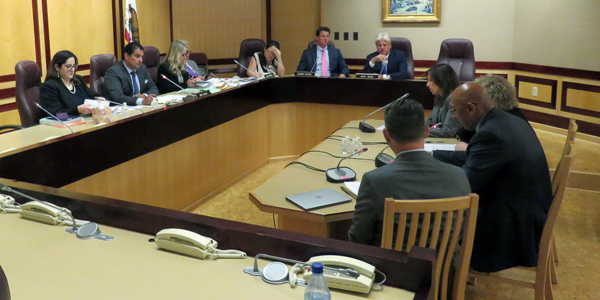By Jason Fordney
SACRAMENTO, Calif. — A California State Senate committee advanced a bill Tuesday that would allow CAISO to be transformed into a Western RTO, a major change in the electricity market that has been met with heavy opposition.
Sponsored by State Assemblyman Chris Holden (D), AB813 garnered the six necessary votes in the Senate Energy, Utility and Communications Committee to move on to the Judiciary Committee for review. The Assembly approved the bill on June 1, and with Gov. Jerry Brown a strong supporter of regionalization, the bill is likely to get his signature if approved on the Senate floor.

Holden, second from right, discusses AB813 with committee Chairman Ben Hueso, second from left. | © RTO Insider
Proponents say the law would help the state export excess renewable energy and create a more efficient regional market, lowering costs.
“This is an opportunity for California to expand our good policies across state borders and to expand upon that,” Holden told the committee. The recently amended bill was carried over from last year’s session. (See Calif. Energy Bills Move Forward, but Big Ones Stall.)
The bill creates a Western States Committee with three representatives from each state with a participating transmission owner, which would provide input on RTO matters that affect more than one state. Left open is the question of whether state voting power would be weighted by electricity load. It also specifically prohibits the creation of a capacity market.
But memories of California’s 2000/01 electricity crisis remain strong in the state, and many interests have expressed concerns about increased oversight of the market by the federal government. CAISO is already regulated by FERC, but some worry California would lose control of clean energy goals to the federal government and other states.

Hertzberg | © RTO Insider
Committee member Robert Hertzberg (D) said that he “generally likes the notion of regionalization” but added that “I am very unhappy as to how this bill has proceeded.” He said he had many concerns about repeating the mistakes of the electricity crisis and negatively affecting the economy by moving jobs out of the state.
“There is an underlying issue that is legitimate with respect to California jobs,” Hertzberg said. “I am deeply concerned across the board.”
The bill has a long list of opponents, including labor groups worried about exporting energy-related jobs to other states and environmental groups, such as Sierra Club and Earthjustice, who say the changes will make California subject to imports of fossil-sourced generation. More than 12 California cities, the Port of Oakland, Sacramento Municipal Utility District, the Utility Reform Network and other groups oppose regionalization.
Former FERC Chairman Jon Wellinghoff addressed the committee, attempting to ease fears about the commission’s oversight. Wellinghoff said FERC acts independently, pointing out it recently dispensed with the Department of Energy’s proposed Grid Resilience Pricing Rule.

Sen. Henry Stern asks former FERC Chairman Jon Wellinghoff about federal jurisdiction over California. | © RTO Insider
“They are really going after PJM … where most of these coal plants reside,” he said of the Trump administration’s effort to bolster coal.
While the regionalization debate continues, CAISO has proposed bringing its day-ahead energy market to the Western Energy Imbalance Market. That measure would allow more energy trading across the region but does not create a new RTO with new multi-state management as envisioned by AB813. (See CAISO Day-ahead Could be Tailored for the West.)



